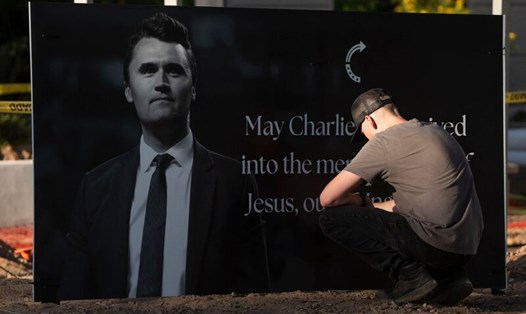The Digital Purge: How Charlie Kirk’s Assassination Unleashed a Coordinated Campaign to Ruin Lives
In the digital shadows of a national tragedy, a new and terrifying kind of manhunt is underway. The targets aren’t assassins or violent criminals; they are teachers, comic book authors, firefighters, and fast-food workers. Their alleged crime? A tweet. A Facebook post. An opinion. In the raw and volatile aftermath of Charlie Kirk’s assassination, a coordinated and ruthlessly effective online campaign is systematically finding, exposing, and ruining the lives of ordinary people, igniting a free speech firestorm and raising chilling questions about the future of public discourse in America.
The campaign began within hours of Kirk’s death. As a nation processed its shock and grief, prominent far-right influencers issued a chilling promise. “I will be spending my night making everyone I find online who celebrates his death Famous,” posted Laura Loomer, a Trump loyalist. “Prepare to have your whole future professional aspirations ruined if you are sick enough to celebrate his death.”

It was not an idle threat. Loomer, along with other activists and a new, anonymously registered doxxing website called “Expose Charlie’s Murderers,” began a systematic effort to collate and publicize any social media post deemed objectionable. The website claims to have received nearly 30,000 submissions, which it plans to turn into a “permanent and continuously-updating archive of Radical activists,” searchable by location and job industry. The effect has been a digital purge with devastating, real-world consequences.
Dozens of people have been fired or suspended. A public school teacher in South Carolina was let go after a post. The Carolina Panthers, an NFL franchise, fired a communications coordinator. DC Comics canceled a just-released comic book series after its author, Gretchen Felker-Martin, allegedly wrote on social media, “Hope the bullet’s OK.” A Middle Tennessee State University employee was fired after Republican Senator Marsha Blackburn drew attention to their post expressing “ZERO sympathy.” The list grows by the hour.

The targets’ “crimes” span a wide spectrum. Some posts were undeniably callous and celebratory. But many others were simply critical, or pointed out the irony of Kirk being killed by gunfire after his past controversial statements that some gun deaths were “worth it” to protect the Second Amendment. Even journalists attempting to cover the story with nuance, like Canadian reporter Rachel Gilmore, have found themselves on the anonymous website, leading to what she described as a “tsunami” of threats that have turned the last 48 hours of her life into “a living hell.”
This phenomenon is more than just “cancel culture”; experts describe it as a “coordinated harassment campaign.” It echoes the tactics of Turning Point USA’s own controversial “Professor Watchlist,” which often led to harassment and violent threats directed at academics. The current campaign, however, is broader and more ruthlessly efficient, targeting not just public figures, but anyone whose online grieving process is deemed unacceptable.
The legal ground for those fired is shaky at best. As legal experts point out, private companies in most states can fire employees for almost any reason, including crass social media posts. The protections for public sector employees are slightly stronger, but even their firings can be justified if the speech is seen as egregious enough to disrupt operations. “The reality of the situation is, if they’re getting flooded… with complaints, it’s likely to push an employer to fire somebody,” explained Jeffrey Hirsch, a labor and employment law professor.
This digital vigilantism has created a profound chilling effect on public discourse. It sends a clear message: in a moment of national tragedy, there is a right way and a wrong way to speak, and the wrong way can cost you your livelihood. It forces a difficult conversation about where the line is between free speech and hate speech, between a tasteless joke and a fireable offense.
The assassination of Charlie Kirk was a horrific act of political violence that has rightly been condemned across the spectrum. But the purge that has followed in its wake is a secondary tragedy. It is a story of how grief can be weaponized, how online mobs can become the arbiters of professional life and death, and how, in our deeply polarized nation, even a tragedy that should unite us can be twisted into another tool to tear us further apart.



